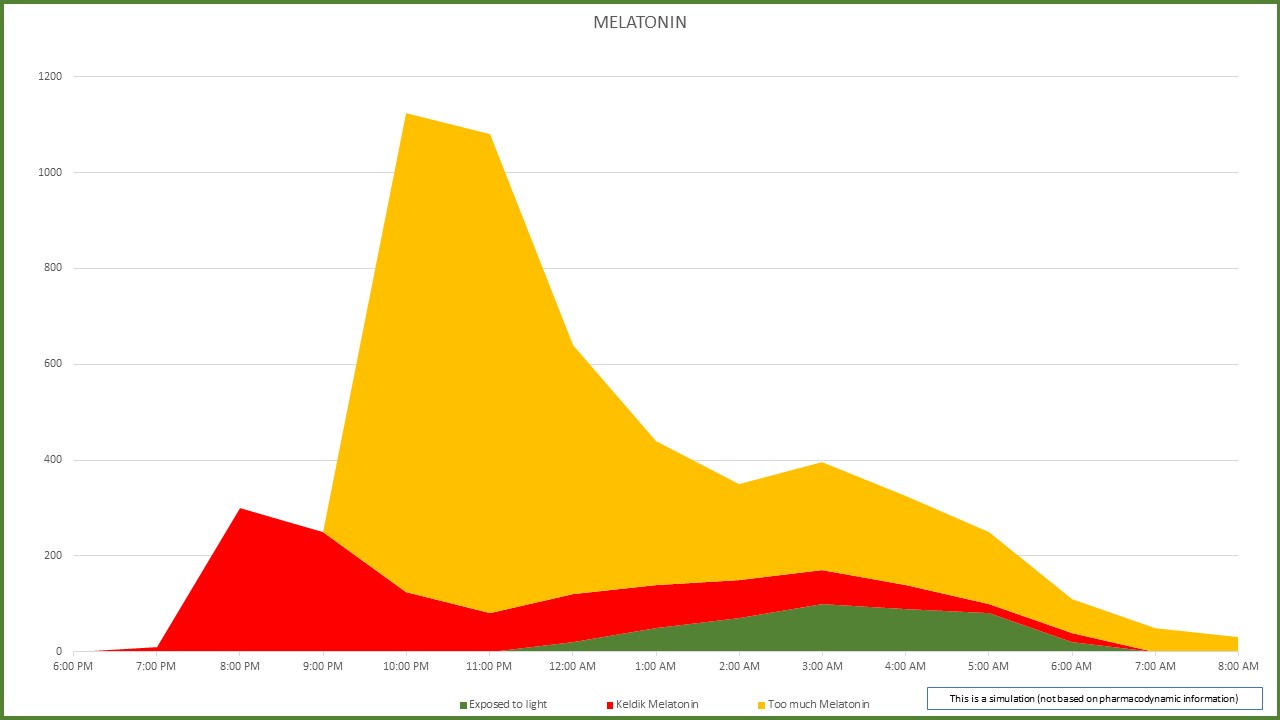Melatonin is a sleep supplement and there are many brands available but choosing the right dose could be very challenging for almost any individuals. Of course we are slightly biased since we are part of Keldik LLC but we certainly have plenty of scientific evidence to back our claims.
Pineal Production of Melatonin
It is important to note that melatonin is produced by almost all the cells in our body but only the melatonin that is produced by the pineal gland seems to have a function in sleep and serves as a messenger for our circadian system. The pineal gland produces a very small amount of melatonin for the entire night. Melatonin is a messenger of the circadian system with production starting approximately 3 hours prior to bedtime and then staying at a steady level until the nadir in core body temperature that happens approximately 2 hours prior to natural wake up time.
In order for melatonin to produce a strong circadian signal, it is important that all melatonin clears out of the body by 6 or 7 AM (in most individuals). Melatonin signals the presence of darkness and the nocturnal period to all our body. Melatonin by itself does not seem to have strong influence in sleep, it just tells our internal clock that it is dark outside and then other mechanisms in the brain will be in charge of initiating the neuroreceptor mechanisms that produce sleep. How do we know this? animals that are nocturnal tend to sleep during the day and stay awake during the night and their melatonin production happens during the night as well. In species that are nocturnal, melatonin is interpreted as a sign of darkness, the same way it is interpreted in humans, but in those species, darkness is a time to be active and awake.
It is important to select a melatonin formulation that contains sufficient melatonin to be in our system during the night but that it is low enough to be out of our system by the time natural melatonin is no longer present in our plasma.
Factors that affect melatonin production
Under natural conditions, melatonin is influenced by the natural day and night cycle that is generated by sun light. With the industrial revolution and the invention of electric lighting, humans started getting significant exposure to light during the night and this may have influenced our melatonin production. Technology and exposure to light can be considered the main disruptors of melatonin production for most individuals. The brain is very sensitive to light at night and any exposure to light will block the production of melatonin. Light that is blue tends to block melatonin very strongly because it stimulates a pigment called melanopsin that is very sensitive to the 580 nm length of the spectrum.
Working irregular hours can also alter the production of melatonin since our internal clock may receive contradicting signals that can change the timing and duration of melatonin production. This is usually observed in individuals that work night shifts such as healthcare professionals, warehouse workers, bakers, etc. When a person stays awake during the night and then tries to sleep during the day, this creates a situation called circadian misalignment. Circadian misalignment can have negative health consequences.
Final recommendation about dosing
Before taking melatonin as a supplement, it is important to control other factors that affect the natural production of melatonin such as exposure to light in the evenings and our schedules in general. Having more regular hours to do different activities tends to send strong signals to the circadian system and this helps generating a strong melatonin secretion that will support sleep during the night.
Since it is impossible to live under constant darkness after 7 pm and to avoid exposure to technology, some individuals may choose to take melatonin on regular basis in order to support their sleep and circadian systems. We recommend taking a dose that is less than 1 mg of melatonin 2 to 3 hours prior to bedtime since that would increase the chances of being able to clear this substance from our bodies before our natural wake up time.
At Keldik, we produce our own melatonin supplements with a total dose of 0.8 mg. This may sound like a very small dose since other companies offer doses that are much higher but most studies have shown that when it comes to melatonin, more than 1 mg tends to be ineffective.
Recommended Blogs posts to read.
Other References
https://www.webmd.com/vitamins/ai/ingredientmono-940/melatonin
https://www.nccih.nih.gov/health/melatonin-what-you-need-to-know
https://en.wikipedia.org/wiki/Melatonin
